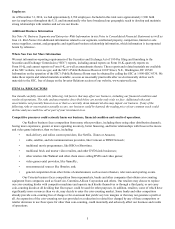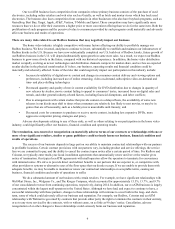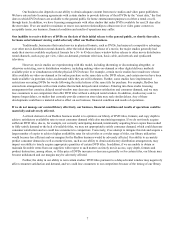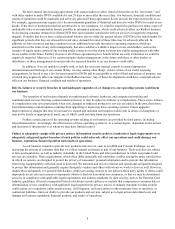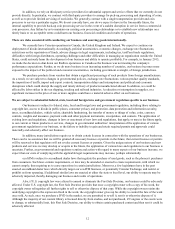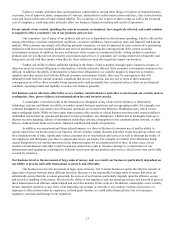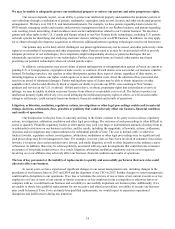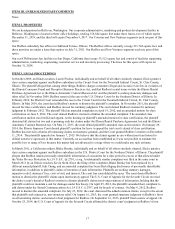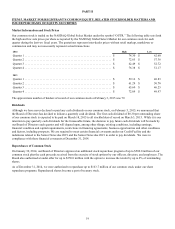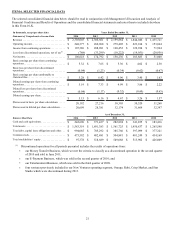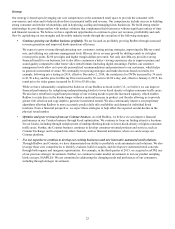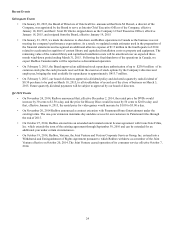Redbox 2014 Annual Report Download - page 22
Download and view the complete annual report
Please find page 22 of the 2014 Redbox annual report below. You can navigate through the pages in the report by either clicking on the pages listed below, or by using the keyword search tool below to find specific information within the annual report.14
We may be unable to adequately protect our intellectual property or enforce our patents and other proprietary rights.
Our success depends, in part, on our ability to protect our intellectual property and maintain the proprietary nature of
our technology through a combination of patents, trademarks, copyrights, trade secrets, licenses and other intellectual property
arrangements. We have over 100 U.S. and international patents. For example, we have patents regarding kiosk systems for
DVD rentals, managing credits and security and inventory management related to our Redbox business, and patents regarding
coin counting, kiosk networking, fraud avoidance and voucher authentication related to our Coinstar business. We also have
patents and other rights in the U.S., Canada and Europe related to our New Venture kiosk technologies, including U.S. patents
on kiosk systems for identifying and analyzing electronic devices relating to our ecoATM business. In addition, we may apply
for or obtain (through development, acquisition or otherwise) additional patents regarding technologies used in our businesses.
Our patents may not be held valid if challenged, our patent applications may not be issued, and other parties may claim
rights in or ownership of our patents and other proprietary rights. Patents issued to us may be circumvented or fail to provide
adequate protection of our technologies. Our competitors might independently develop or patent technologies that are
substantially equivalent or superior to our technologies. Further, since patent terms are limited, other parties may begin
practicing our patented technologies when our related patents expire.
In addition, certain parties may assert claims of patent infringement or misappropriation against us based on current or
pending U.S. or foreign patents, copyrights or trade secrets, or contracts. If such claims were successful, our business could be
harmed. Defending ourselves, our retailers or other third parties against these types of claims, regardless of their merits, or
initiating litigation to enforce our rights, could require us to incur substantial costs, divert the attention of key personnel and
result in an award of substantial damages. Parties making these types of claims may be able to obtain injunctive or other
equitable relief, which could effectively block or impair our ability to provide our DVD, coin-counting or New Venture
products and services in the U.S. or abroad. If third parties have, or obtain, proprietary rights that our products or services
infringe, we may be unable to obtain necessary licenses from others at a reasonable cost or at all. The failure to protect our
intellectual property rights effectively or to avoid infringing the intellectual property rights of others, as well as unfavorable
rulings or settlements, could seriously harm our business, financial condition and results of operations.
Litigation, arbitration, mediation, regulatory actions, investigations or other legal proceedings could result in material
rulings, decisions, settlements, fines, penalties or publicity that could adversely affect our business, financial condition
and results of operations.
Our business has in the past been, is currently and may in the future continue to be, party to class actions, regulatory
actions, investigations, arbitration, mediation and other legal proceedings. The outcome of such proceedings is often difficult to
assess or quantify. Plaintiffs, regulatory bodies or other parties may seek very large or indeterminate amounts of money from us
or substantial restrictions on our business activities, and the results, including the magnitude, of lawsuits, actions, settlements,
decisions and investigations may remain unknown for substantial periods of time. The cost to defend, settle or otherwise
finalize lawsuits, regulatory actions, investigations, arbitrations, mediations or other legal proceedings may be significant and
such proceedings may divert management’s time. For example, in recent years we have been involved in consumer class action
lawsuits, a securities class action and derivative lawsuit, and studio litigation, as well as other litigation in the ordinary course
of business. In addition, there may be adverse publicity associated with any such developments that could decrease consumer
acceptance of our products and services. As a result, litigation, arbitration, mediation, regulatory actions or investigations
involving us or our affiliates may adversely affect our business, financial condition and results of operations.
The loss of key personnel or the inability of replacements to quickly and successfully perform in their new roles could
adversely affect our business.
In recent years, we have experienced significant changes in our senior management team, including changes in the
presidents of our business lines in 2013 and 2014 and the departure of our CEO in 2015. Further changes in senior management
could result in disruptions to our operations. If we lose or terminate the services of one or more of our current executives or key
employees or if one or more of our current or former executives or key employees joins a competitor or otherwise leaves or
competes with us, it could harm our business and our ability to successfully implement our business plan. Additionally, if we
are unable to timely hire qualified replacements for our executive and other key positions, our ability to execute our business
plan could be harmed. Even if we can timely hire qualified replacements, we would expect to experience operational
disruptions and inefficiencies during any transition.



